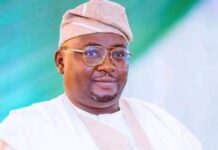As the debate on the review of the revenue allocation formula gathers momentum, the Lagos State government has canvassed for a special status for the state going by its unique features and as the economic nerve of the country.
To this end, the state governor, Babajide Sanwo-Olu yesterday demanded for one per cent share in the federal revenue allocation formula.
In a memorandum submitted at the opening of a two-day southwest zonal public hearing on review of the revenue allocation formula organised by the Revenue Mobilisation, Allocation and Fiscal Commission (RMAFC), Sanwo-Olu proposed that the revenue sharing formula should be 34 per cent for the federal government, one per cent for the Federal Capital Territory, 42 per cent for the states, 23 per cent for local the governments and one per cent for Lagos State (special status).
In the current arrangement, the federal government walks away with 52.68 per cent, the 36 states, 26.72 per cent while the 774 local government areas are allocated 20.60 per cent.
The governor argued that allocating one per cent to Lagos State and allowing the three tiers of government to share 99 per cent in a new revenue sharing formula is straightforward, self-justifying and in no way controversial.
He said the review of the current revenue allocation formula was long overdue, stressing that the best way to guarantee national progress and development is to pay attention to sub-national development since the national is a summation of the sub-national.
The governor reiterated the call for the state to be accorded special status in recognition of its huge financial commitments to infrastructure and provision of basic amenities for the increasing population of residents, as well as its preeminent contribution to the national coffers.
“Our demand is a sharing formula that is just, fair and equitable; reflecting the contribution of stakeholders to the common purse; and also one that enhances the capacity of state and local governments to deliver high-quality services and the full dividends of democracy to the greatest number of our people.
“Lagos State is, no doubt, the nation’s commercial capital, and population centre. The level of funding required to service the state’s social and public infrastructure is so significant that it will be difficult for the state to bear the burden for much longer under the present arrangement.
“I should say that it will actually be unfair to expect the state to bear this heavy burden on its own. It is, therefore, necessary to give due consideration to all the variables that support our advocacy for a special status.
“The call for a special status for Lagos is not a selfish proposition; it is in the best interest of the country and all Nigerians, for Lagos which accounts for about 20 per cent of the national Gross Domestic Product (GDP) and about 10 per cent of the nation’s population to continue to prosper,” he said.
Further defending the demand for special status, Sanwo-Olu said Lagos is more than just another state in the country stressing that there is no tribe in Nigeria without significant stake in the state.
“As the former capital of the country for 77 years (compared to the 30 years that Abuja has been the Federal Capital Territory), Nigeria’s largest metropolis still bears the heavy brunt of being home to all Nigerians; irrespective of age, class, gender, religious affiliation or tribe.
“There are several statistics that show the number of people that come into Lagos every day, however, there are clear indications that most of these people migrate with the intention to make Lagos their new home and in pursuit of personal dreams due to the opportunities the city-state seemingly possesses, and this portends additional responsibilities on the government.
“Additionally, Lagos still harbours a huge number of federal establishments, which could not be moved to Abuja. These include military cantonments and barracks, police, customs, immigration, civil defence, prisons, road safety and security/intelligence establishments.
“There are several reasons to justify the call for a special status for Lagos apart from the aforementioned factors and by extension, a review of the Revenue Allocation Sharing Formula.”
The governor stress that it would be unfair for Lagos to be left alone to bear the burden of the massive destruction experienced by the state during the EndSARS protest as well as the COVID-19 pandemic.
“This month marks one year after the massive destruction experienced by the state in the violence that accompanied the hijacking of the EndSARS protests. Public buildings were burnt down, and historical infrastructure destroyed.
“Although, we have put that experience behind us and forged ahead, the reality of this unfortunate incident remains with us; resources that should be committed to other areas of need are now being used for the restoration of these public facilities. It will be totally unfair for Lagos State to be left alone to bear these huge expenses without assistance from the centre.
“COVID-19 pandemic is another issue that has once again, supported the justification for Lagos to be accorded the privilege of a special status. As much as this affects the entire country, it is a fact that the degree of havoc caused by this virus differs from state to state.
“Lagos was the epicentre for this virus, the same way it was for the Ebola virus some years ago. The management of these unforeseen occurrences comes with huge responsibilities and financial commitments on the part of the state government,” he said.



























































